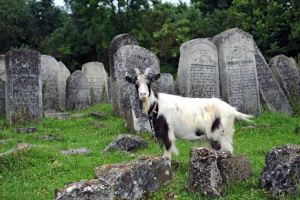
In 1997, the Congressional Cemetery on Capitol Hill landed a spot on the National Trust for Historic Preservation's list of endangered historic sites. The resting place of famed composer John Phillip Sousa, as well as thousands of other notable and unknown civil servants, was a crumbling, weed-choked ruin. Today, however, the cemetery has been restored and improved. Its website describes the 35-acre area as a "historic yet active burial ground, " which hosts 5K runs, as well as tours, a book club, and an exercise class called Yoga Mortis. And now, goats.
Providing a Service
Paul Williams, President of Historic Congressional Cemetery, says the goats are providing a much-needed service. They keep the grounds free of invasive weeds that would otherwise choke the landscape. The cemetery sits adjacent to the Anacostia River, and groundskeepers are sensitive to the hazards of using herbicides that would runoff the property into the water. The goats munch on, and are effectively eliminating, non-native species such as:
- Poison Ivy
- Poison Oak
- Poison Sumac
- Kudzu
- English Ivy
Williams says if the interlopers are not controlled, they climb the trees, kill them, and then the trees fall and damage the historic headstones. In addition, as the grazers get rid of the weeds, other plants have more room to flourish. That's good for the bees.
Cheap, Clean Labor
Williams says the goats are a sound economic choice. It costs about $2,500 each week to keep a herd of 30 goats on the job, which breaks down to around $1 per goat per hour of labor. Typically, cemeteries spend many hundreds of thousands of dollars annually to maintain acreages a fraction of the size of the Congressional Cemetery. Biocontrols such as using goats for weeding began to gain popularity in western states such as Colorado and California in the 1990s, as farmers and gardeners struggled to find solutions that used fewer chemicals to control invasive weeds.
Attitude Adjustment
Of course, when a landscape maintenance crew decides to hire a herd of goats to clean up a 35-acre property, there are some adjustments. Goats like variety, so it is best not to try to limit them to a single species. Also, they will work at their own speed, which may not be on a pace with chemical herbicides. On the plus side, they are thorough, and can rid a large area of killer vines in a couple of weeks.
The eco-goats that work the land at the cemetery come from prosperity farms in southern Maryland. Cemetery Lauren Maloy says the goatmowers, as they are known locally, have become quite the attraction. They are welcomed and loved by kids and adults alike, says Maloy, who is considering planning a few events around their visit, including a happy hour.
Inadvertently, the goats add to the list of free attractions in Washington, D.C. Admission to the Congressional Cemetery is always free of charge. People who come to see the goats can stay for a self-guided walking tour of the grounds and its historic plots, or catch a showing of Alfred Hitchcock's Psycho at the Cinemetery event.
Living Cemetery
The goat program at the Congressional Cemetery is an important part of the rebranding of the site as a whole. Directors and officials such as Williams and Maloy seek to position the property as a vibrant destination within the Washington, D.C. community. Even the language of their website is inviting and somewhat tongue-in-cheek. In the FAQ section of the About Us page, one of the questions asks if one has to be a member of Congress to be buried there. The answer reads, "No. You just have to be dead." It is clear that the goatmowers are just part of the charm of a visit to the Congressional Cemetery.
Add Your Comment